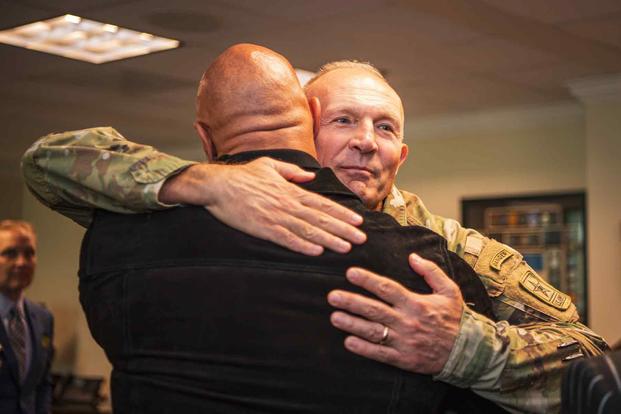The Army inked a significant sponsorship deal with the little-known United Football League, or UFL, the upstart minor league alternative to the NFL, after internal reviews on the idea found the investment would be unlikely to yield new recruits in a meaningful way, according to documents obtained by Military.com.
The roughly $11 million deal set the service up to be the premier partner for the league's inaugural season, which started last month, and created a relationship between the Army and Dwayne "The Rock" Johnson, an owner of the league, global celebrity and top-tier online influencer. The deal was more than a year in the making, and planning started before the league was formed by the merger of two other minor football leagues, the XFL and USFL.
The Army pitch originally started as a $25 million sponsorship with the XFL in February 2023. Despite the reduced cost of the UFL sponsorship, service planners behind the scenes spent much of the past year warning that the advertising bang for the buck simply wasn't there, documents show. Internal data reviewed by Military.com found that the Army estimated the UFL sponsorship deal would net only between 160 and 891 new recruits.
The football sponsorship, unveiled for the first time this week in The Wall Street Journal, comes as the Army has struggled to find its footing in an evolving media space and pitch service to Gen Z. The difficulties have been highlighted by years of missed recruiting goals.
The service isn't allowed to advertise on TikTok, where young Americans consume much of their media. While the Army has boosted investments in Instagram and streaming platforms, it's still heavily invested in traditional cable advertising.
Documents show that from the beginning Army marketing officials and other staff in the service were skeptical of the partnership with the UFL. Much of the concern was raised as the Army was mulling a partnership over the past year with other minor league football leagues such as the XFL and USFL, which went on to form the UFL.
But the bottom line remains much the same: Investments in minor league sports are risky, given relatively poor viewership, and professional athletics is generally losing relevance with Gen Z, the prime demographic for Army recruiting.
Some Army staff warned that a multimillion-dollar deal with minor league football would run an enormous risk of being wasted, with some service marketing officials telling Military.com it appeared to echo other major sports advertising blunders, including the National Guard's ill-fated spending on a NASCAR sponsorship that didn't appear to yield recruits.
Recently retired Maj. Gen. Alex Fink, the chief of the Army's marketing arm at the time, warned in March 2023 that the XFL had little meaningful presence online and relatively low social media engagement, according to a memo obtained by Military.com.
"These posts do not demonstrate interest or excitement from our prospect audience or influencers," Fink noted in the memo. "Less than [1,500] posts fall within the 18-35 age range."
Ignatios Mavridis, the deputy chief for Army marketing, warned in August that XFL ratings were underperforming and that he didn't anticipate much increase in interest down the road, according to an internal memo. He said money being spent there would be redundant, given the Army's more careful ad placement in the NFL and other higher-profile sporting events.
"The XFL provides minimal unique market coverage not already supported by the Army's current media plan," Mavridis said in the memo. He recommended the Army not pursue any major relationship with the league.
"Limit any partnership activities with the XFL to the local level," he noted, meaning it should just be an environment in which recruiters are present to talk to attendees.
But the UFL deal was finalized after a push from Gen. Randy George, the Army chief of staff, despite the officials around him warning against the idea, sources familiar with the situation said. Military.com reviewed numerous internal service documents and email correspondence between staff and senior Army leadership.
Col. Dave Butler, George's spokesperson, said Army marketing officials eventually signed off on the idea and recommended pursuing the deal with the UFL. But when asked for evidence confirming the shift, Butler declined to show any documentation to Military.com.
The deal includes the Army logo being displayed prominently on the jerseys of players on each of the eight teams, a logo on the field and other key branding during the game, including replays and social media posts.
"The goal with this and any of our partnerships is to bring about a lasting change in how the Army is perceived by the American public," Laura DeFrancisco, a spokesperson for the Army Enterprise Marketing Office, or AEMO, said in a statement. "We want to show America that the Army is a great place to find your purpose and become the best version of yourself."
Perhaps just as importantly, the service has Dwayne "The Rock" Johnson, an owner of the league, as a pseudo brand ambassador for the service.
Johnson is among the world's most popular celebrities, has broad generational appeal and generally doesn't participate in propping up brands in which he doesn't have a financial stake. But his star power also caused concerns among some Army officials, who worried it was influencing the service's take on the sponsorship.
"This stunk of old ways of thinking and the Army just wanting to get The Rock in the room and get him in an Army shirt once in a while," one service official with direct knowledge of the deal said. "I think some people in charge got starstruck, and because of that we blew millions."
It's unclear how often Johnson is expected to have sponsored posts showcasing the Army on his personal channels, such as Instagram, or where much of his value as a partner would likely come from. Instead, the deal is specific to the UFL and Army logo placements, which may come with occasional support from Johnson.
"We believe in this league. I think you're going to see great football," Johnson said on Fox Sports in February. "I've gotten to know Gen. George and we've become pretty good buddies. … He's deeply passionate about the recruitment of the Army."
However, Johnson's outspokenness was seen as a potential risk by Army planners, including his support of Democratic candidates, particularly President Joe Biden; his open support of Black Lives Matter; and critiques of former President Donald Trump, service documents show.
"The Rock and his massive social media following have value but have also raised some brand safety risk," an internal Army document on the plan says. "Given the data available, it is uncertain what level of gain to expect from this component, but it would provide the U.S. Army an opportunity to partner with one of the world's biggest influencers."
Overall, the UFL itself was seen by Army staff who were interviewed as the weak part of the deal, despite being the central purpose on paper. Instead, Johnson was seen as a key media ally.
The league was deemed to have "low contribution" to the service's media goals due to the challenges of gaining popularity for an unknown league, as well as the poor ratings of previous NFL alternatives.
"We'll evaluate the partnership over the next year and determine the [return on investment] and see if this is something we want to do longer term," George wrote in an email to top Army officials, including Army Secretary Christine Wormuth, in late March.
The deal was finally reached after Army staff agreed that the $11 million would not come from the traditional marketing budget, preventing any notable disruption to other deals and ad buys.
Service planners found that it's nearly impossible to project the success of investing in the first year of a professional sports league, but saw the opportunity to score favorability as the first major sponsor -- which could lead to longer-term benefits and advantages with future marketing campaigns.
During its first week, the UFL had 1.05 million views but that fell to 844,000 during its second week -- a 19% decline in viewership, according to reporting from the Sports Business Journal.
Within that, Gen Z viewership might be slim, as that generation has almost completely cut away from traditional television and is far less interested in sports than previous generations. A 2022 poll by Morning Consult found 33% of Gen Zers do not watch live sports, compared to 22% of Millennials.
Related: The Army Recruiting Ad Featuring a Soldier with 2 Moms Just Got Harder to Find. Here's Why.












